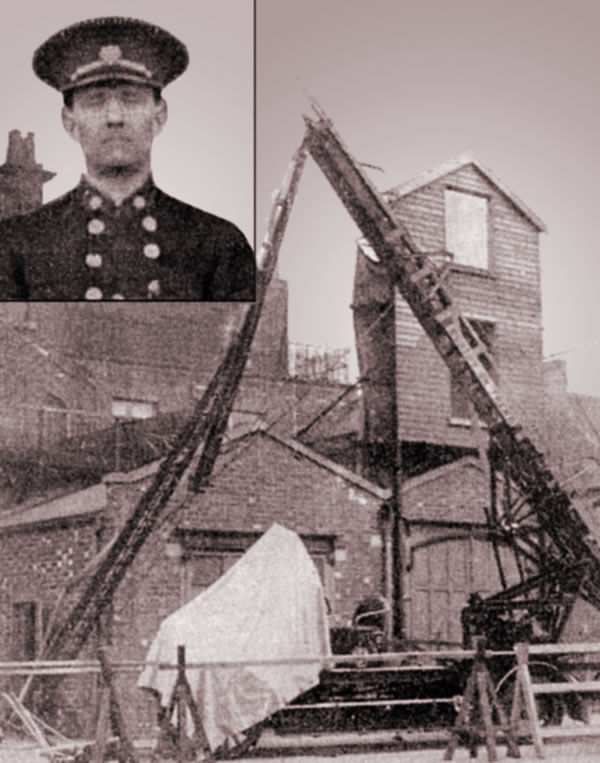Fire Brigade – Call of Duty
At 5:15pm on the Saturday afternoon of 1st November 1924, Burton Fire Brigade was called to assist the Bass and Allsops brigades at a large fire at the English Grains Warehouse in Derby Road. The warehouse was packed full of highly flammable dried Barley grain. After a few hours, the blaze was almost under control when an increase in wind from a changed direction fanned it back to life, re-igniting areas that had already been extinguished. The occasional crash could be heard as internal walls collapsed. Two firemen, William Hamp and Deputy Superintendent John Bennett were working off the flat roof of an adjacent building. John Bennett noticed that the nearby wall was starting to collapse, caused by the swelling og the grain due to being soaked in water. He shouted to his comrade warning that they should flee but John was struck by falling debris. A heavy coping stone and fallen across his legs.
William and other colleagues return to frantically get him clear and apply a tourniquet to his right leg which was bleeding badly. He was rushed to Burton Infirmary where he was diagnosed as suffering from a severe compound fracture. The decision to amputate was deferred and he was presented with a bottle of champagne in hospital to celebrate. The celebration proved to be premature however; after the build up of toxins, his leg had to be amputated and he deteriorated, dying a few days later with his wife and son by his hospital bed.
John Bennett’s funeral procession started from his house in Park Street to the Weslyyan Chapel on the corner of Union Street and Station Street and from there to Stapenhill cemetry. Hundreds of people lined the route. The cortege has headed by both members of the police and fire brigade. The coffin was carried on a Corporation fire engine. On top were John’s helmet, fireman’s belt and axe. A Bass engine followed covered in wreaths and tributes.
John came to Burton from Warwickshire and had been in the town’s Fire Brigade for 37 years and risen to Deputy Superintendent. This was the first ever fatality in the history of Burton Fire Brigade. In commemoration, a brass plaque was provided and hung in the fire station. It was unveiled by Captain Mitchell by removing a Union Jack and may still be seen in the existing museum at New Street Fire Station.

On the evening of February 8th 1832, Burton Fire Brigade carried out a practice drill. Thirty-five year old fireman, John Williams, who had been with the brigade for six years having joined from the Bass Brigade, was suspended by a rope and belt from the 60ft drill tower at the rear of the fire station in New Street.
The exercise was taking place in failing light, illuminated by search-lights. A number of successful similar exercises had been carried out in daylight.
Fireman Percy Clark was the turntable ladder operator for the exercise. It was one of the latest Merryweather motor turntables with a reach of 80ft. After a signal from John Richard Williams, he began to elevate the ladder away from the building. Unbeknown to Percy, one of the ladder’s extending wires had become snagged on a ledge of the building. Colleagues on the ground watched in horror as the ladder suddenly began to strain before giving way with a loud snap and the upper half plummeting to the ground with a crash, narrowly missing some of those observing. John fell to the ground from his position at the top of the tower to the concrete surface with the escape ladder falling on top of him. Dr Davidson appeared on the scene fairly quickly but pronounced John dead at the scene.
John was married with one child and had served in WWI as a transport driver stationed in France. His funeral took place St Paul’s church with a guard of honour being formed by his colleagues.


